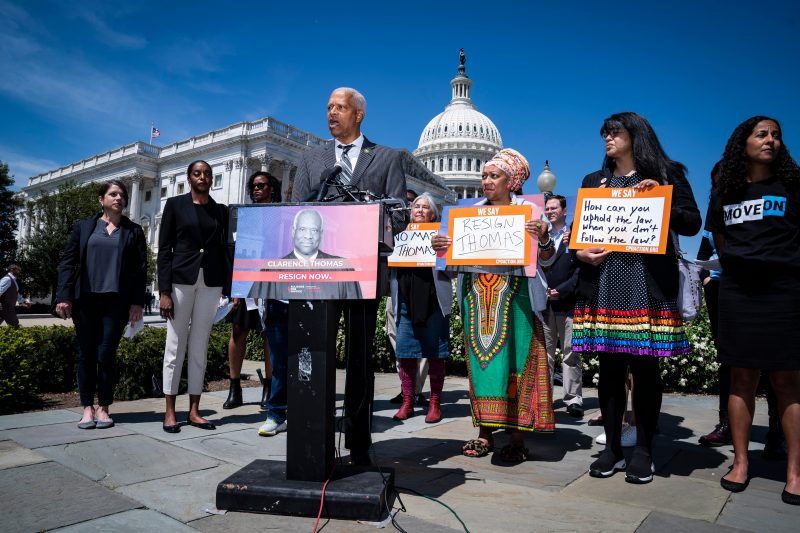On Tuesday morning, before any senators arrived at a hearing to discuss Supreme Court ethics reform, the voice of Clarence Thomas boomed through the wood-paneled walls of the Senate Judiciary Committee’s meeting room.
“Senator, I would like to start by saying unequivocally, uncategorically, that I deny each and every single allegation against me today.”
The sound was from a 1991 video of Thomas defending himself before the committee amid Anita Hill’s sexual harassment allegations. The clip repeated itself as technicians tested the playback. More sound: A younger Sen. Joe Biden (D-Del.) gaveling the committee to order. “Judge, tough day and tough night for ya, I know,” he said.
Guests arriving for Tuesday’s hearing were just starting to filter in. Some looked around in confusion at the disembodied voice.
The famously taciturn justice is, once again, facing allegations that call into question the propriety of his conduct while holding a high government post. ProPublica has reported that Thomas received, for over 20 years, luxurious gifts and hospitality from real estate magnate Harlan Crow, a conservative billionaire and GOP donor.
“Tough day and tough night for ya, I know,” Biden’s voice repeats overhead.
It’s been a tough few weeks for Sen. Richard J. Durbin (D-Ill.), the chair of the judiciary committee. In the wake of these revelations, there was a zeal among liberals and watchdog types for someone to do something to hold Thomas accountable for what they saw as a flagrant violation of long-standing norms of judicial ethics — and possibly the law. Some were calling on Durbin to take an action that has happened only once before in this country: using the Senate’s subpoena power to haul Thomas across Constitution Avenue to appear before the panel and explain himself.
“There are a number of us who feel that a subpoena ought to be on the table,” said committee member Sen. Richard Blumenthal (D-Conn.) in a brief interview with The Washington Post in late April. “If Clarence Thomas declined to appear voluntarily he should be invited to explain this absolutely mind-boggling series of gifts — luxury cruises and plane rides and money payments.”
Would the justice even comply, if it got that far? When the infamous House Un-American Activities Committee subpoenaed Justice Tom Clark in 1953, the justice simply declined to appear, and the committee didn’t try to force compliance in court. This time around, the situation was further complicated by the absence of committee member Sen. Dianne Feinstein (D-Calif.), who would ostensibly provide a crucial vote that would allow the Democrats to get legislation, or a subpoena, through the panel over Republican opposition. (Feinstein has been recovering from shingles for more than two months.)
Against these procedural head winds, Durbin, whose staff did not make him available for an interview, chose a more diplomatic path.
“I invited the chief justice to join this conversation,” he said when Tuesday’s hearing began. But the chief justice had declined, as many had expected, citing “separation of powers concerns.” Durbin didn’t exactly buy that. “The reality is that sitting justices have testified at 92 congressional hearings since 1960,” he said, “and I even offered the chief justice the opportunity to designate someone else on the Court to testify.”
What else would he be willing to do? When it comes down to it, how do you solve a problem like Clarence Thomas?
We’re told that out there, in the constitutional ether, lies a strict separation of powers that precludes any interference by Congress and the president with the independence of judges. Lately, in the case of the upper chamber and the high court, that system looks like this: Durbin in a standoff with Chief Justice John G. Roberts Jr., in a battle of polite letters.
“We urge you to immediately open … an investigation and take all needed action to prevent further misconduct,” read Durbin’s first public letter, signed by all the Democrats on the committee.
No reply.
Then a request. Would Roberts please appear in front of the committee?
“I must respectfully decline your invitation,” Roberts wrote back, as “one might expect in light of separation of powers concerns and the importance of preserving judicial independence.”
“It is noteworthy,” Durbin replied, “that no Justice will speak to the American people after numerous revelations have called the Court’s ethical standards into question.”
It is noteworthy. That is where things stood heading into the hearing — which, in the absence of any actual Supreme Court justices (or Crow, Thomas’s generous billionaire buddy) featured testimony from a garden variety of legal experts, who would try to offer a thoughtful perspective on the code of conduct that Supreme Court justices must abide by. (There is none.) A law professor and a litigator went back and forth over knotty constitutional questions on what Article III said and didn’t say (that’s the one about the judicial branch). Both Democrats and Republicans mused about what the Founding Fathers might have wanted for this nation more than 200 years ago, before private jets and megayachts existed. Michael Mukasey, a former federal judge who was called to testify by the Republicans, entertained a hypothetical scenario in which a wealthy friend offered him a free vacation via private plane.
“Would I have refused and endangered the friendship?” Mukasey, who also served as attorney general, wondered aloud. “I’m not sure that I would’ve.”
The Republican politicians at the hearing claimed that the exercise was just the latest volley in a decades-long campaign to undermine the court and, specifically, the justice they named to replace Thurgood Marshall — hence the 1991 video, offered by Sen. John Cornyn (R-Tex.), in which Thomas famously called the Anita Hill hearing a “high-tech lynching.”
“I think here’s what you’re trying to do on the Democratic side,” said Sen. Lindsey O. Graham (R-S.C.), the panel’s top Republican, before producing a poster board with the headline “Democrats Threaten the Roberts Court.”
“It’s awkward for me to be here,” remarked former federal judge Jeremy Fogel, as he attempted to keep clear of the partisan sniping he’d tried to avoid while serving on the bench.
Democrats looked away, uninterested, when the old video of Thomas and Biden played. Sen. Sheldon Whitehouse (D-R.I.), who took over the gavel when Durbin exited the hearing during roll call votes, abruptly cut off Cornyn as he was responding to a witness who was talking about the importance of separation of powers.
“The senator’s time has expired — minutes ago,” Whitehouse said, matter-of-factly.
But the news about Thomas gave way to a stream of stories about other conservatives on the Supreme Court: Neil M. Gorsuch reportedly selling a 40-acre Colorado property to the head of a law firm that frequently comes before the Court. The wife of the chief justice reportedly making millions recruiting lawyers to top firms. A conservative law school reportedly offering generous benefits to many of the conservative justices as part of plum academic contracts. Two days after Durbin’s hearing, ProPublica would report another story about Thomas and Crow, saying that Crow paid for the boarding school tuition of Thomas’ grandnephew, whom the justice has said he raised as a son. On Thursday, The Post reported that Leonard Leo, the architect of the conservative legal movement, arranged for Thomas’s wife to be quietly paid $25,000 in consulting fees.
But at the hearing, the idea of the Senate scrutinizing justices was being waved away as nosiness.
“Justice Barrett, if you’re listening, I hope you don’t have overdue library books,” quipped Sen. John Neely Kennedy (R-La.).
Legal experts point out that senators have, in theory, an arsenal of tactics at their disposal to police the Supreme Court. They could threaten to drain the court’s budget during its yearly review. They could urge the Department of Justice to appoint a special counsel to investigate potential charges. They could consolidate support for impeaching a member of the bench, as some members of the House have unsuccessfully tried to do with respect to Thomas.
Congress could also do what the Constitution empowers it to do: pass legislation. On Tuesday, an eagle-eyed photographer captured an image of notes belonging to Senate Majority Leader Charles E. Schumer (D-N.Y.) that suggested that Feinstein could return as soon as next week — in which case the committee could move legislation to the Senate floor more quickly. (Any bill would face steep odds in the GOP-controlled House.)
Whitehouse has taken a parallel route. He and a House colleague, Rep. Hank Johnson (D-Ga.), sent a letter urging the Judicial Conference of the United States, the agency charged with administering the courts, to refer Thomas to the attorney general for investigation. A top official in the conference forwarded the letter to an internal committee for further action.
The Rhode Island Democrat has been sending letters for a while. At the hearing, he punctuated his opening remarks by slapping down stapled sheets of paper in front of him — missives he’d sent to different judicial entities inquiring about the bounds of Supreme Court ethics. “That would be Exhibit 3 … That’s Exhibit 5 … Exhibit 10.” He’s gotten few satisfactory answers.
In an interview walking along Constitution Avenue back to his office in late April, Whitehouse said the justices have “now dug themselves into a hole so deep that other entities are going to have to act.”
For now, however, the political wherewithal of the judiciary committee will be mediated by the senator, Durbin, who heads it.
On Tuesday, after most of the guests had emptied out of the room, Durbin offered his view of the man who wouldn’t show up to his hearing.
“I respect him,” he said of Roberts. ”I really think this is his Court and he can make of it what he wishes.”
This story has been updated.



























